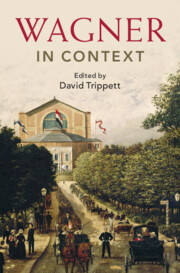Book contents
- Wagner in Context
- Composers in Context
- Wagner in Context
- Copyright page
- Contents
- Illustrations
- Musical Examples
- Contributors
- Acknowledgements
- Abbreviations
- Introduction
- I Place
- II People
- III Politics, Ideas, and Bodies
- Chapter 15 National Politics
- Chapter 16 Revolutionary Politics
- Chapter 17 World-Drama: Wagner’s Hegelian Heritage
- Chapter 18 Towards an ‘Ideal’ Feminine
- Chapter 19 Health and Wellness
- Chapter 20 Sexuality and Social Mores
- Chapter 21 Sentient Bodies
- Chapter 22 Racial Theory
- IV Life, Language, and the Ancient World
- V Music and Performance
- VI Reception
- Further Reading
- Select Bibliography
- Index
Chapter 15 - National Politics
from III - Politics, Ideas, and Bodies
Published online by Cambridge University Press: 14 March 2024
- Wagner in Context
- Composers in Context
- Wagner in Context
- Copyright page
- Contents
- Illustrations
- Musical Examples
- Contributors
- Acknowledgements
- Abbreviations
- Introduction
- I Place
- II People
- III Politics, Ideas, and Bodies
- Chapter 15 National Politics
- Chapter 16 Revolutionary Politics
- Chapter 17 World-Drama: Wagner’s Hegelian Heritage
- Chapter 18 Towards an ‘Ideal’ Feminine
- Chapter 19 Health and Wellness
- Chapter 20 Sexuality and Social Mores
- Chapter 21 Sentient Bodies
- Chapter 22 Racial Theory
- IV Life, Language, and the Ancient World
- V Music and Performance
- VI Reception
- Further Reading
- Select Bibliography
- Index
Summary
When Wagner was born in 1813, Germany did not exist. Saxony was part of Napoleon’s ‘Confederation of the Rhine’, a collection of puppet-states. By the time he died, the German Empire was the most powerful and prosperous state in continental Europe. This sensational transformation was marked by periodic domestic upheaval (the revolutions of 1830 and 1848–9), a demographic explosion, an industrial revolution and three victorious wars for Prussia (against Denmark in 1864, Austria in 1866, and France in 1870). The accompanying political, social, and cultural changes were on a commensurate scale. Nationalism, liberalism, conservatism, socialism, and political Catholicism all emerged as mass movements, responding to radical changes in the public sphere driven by urbanisation, mass literacy and a communications revolution. By the time Wagner died in 1883, Germany had changed more than during the previous millennium.
- Type
- Chapter
- Information
- Wagner in Context , pp. 151 - 158Publisher: Cambridge University PressPrint publication year: 2024



